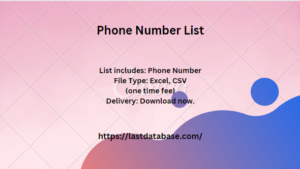Post by account_disabled on Mar 6, 2024 10:24:10 GMT
Prevention of Double Voting and Fraud Blockchains consensus mechanisms such as Proof of Work or Proof of Stake play a crucial role in preventing double voting and fraud. Once a vote is recorded on the blockchain the consensus mechanism ensures that the majority of the network validates the transaction adding an extra layer of security and trust to the voting process. Accessibility and Convenience Blockchainbased voting systems can enhance accessibility and convenience for voters. Through secure online platforms voters can cast their ballots from the comfort of their homes turnout.
The decentralized nature of blockchain also reduces the reliance on physical polling stations making the electoral process more inclusive. Realtime Results and Phone Number List Auditability Blockchain enables realtime verification of election results. As votes are recorded on the blockchain the tallying process becomes instantaneous providing timely and accurate results. Additionally the transparent and auditable nature of the blockchain allows for postelection audits assuring the accuracy of the results.

Challenges and Considerations While the potential benefits are significant the implementation of blockchain in voting systems comes with challenges. Issues such as ensuring voter privacy protecting against coercion and addressing the digital divide need careful consideration. Ongoing research collaboration and the development of robust regulatory frameworks are essential to overcoming these challenges. Conclusion In conclusion integrating blockchain technology into voting systems holds the key to enhancing election security and fostering trust in democratic processes. The transparency immutability and decentralized nature of blockchain provide a resilient foundation for securing votes and maintaining the integrity of elections. As technology continues to evolve the adoption of blockchain in voting systems represents.
The decentralized nature of blockchain also reduces the reliance on physical polling stations making the electoral process more inclusive. Realtime Results and Phone Number List Auditability Blockchain enables realtime verification of election results. As votes are recorded on the blockchain the tallying process becomes instantaneous providing timely and accurate results. Additionally the transparent and auditable nature of the blockchain allows for postelection audits assuring the accuracy of the results.

Challenges and Considerations While the potential benefits are significant the implementation of blockchain in voting systems comes with challenges. Issues such as ensuring voter privacy protecting against coercion and addressing the digital divide need careful consideration. Ongoing research collaboration and the development of robust regulatory frameworks are essential to overcoming these challenges. Conclusion In conclusion integrating blockchain technology into voting systems holds the key to enhancing election security and fostering trust in democratic processes. The transparency immutability and decentralized nature of blockchain provide a resilient foundation for securing votes and maintaining the integrity of elections. As technology continues to evolve the adoption of blockchain in voting systems represents.
